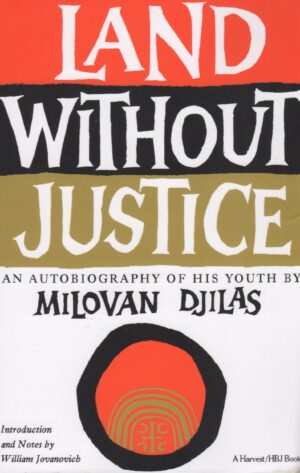
Land Without Justice by Milovan Djilas (1958. Harcourt. ISBN 978-1-15-648117)
Just so you know. I’m in the process of trying to write a second historical novel regarding Slovenia from the 1930s to present day. My first effort, The Legacy, was well received but I feel, in retrospect, taht novel was a bit too sentimental in its treatment of the rise and fall of Tito, Yugoslavia’s dictator who controlled the fate of the Balkans until his death. In my second attempt at writing the Great Slovenian American novel, I’m trying to paint with a broader brush and understand why, within a decade of Tito’s demise, Yugoslavia ceased to be and the region once again found itself plunged into terror and war. In any event, I’m reading some of the literature of Milovan Djilas, one of Tito’s trusted lieutenants who, in 1954, ended up falling from grace to spend decades in prison and/or under house arrest. This is the first of two Djilas books I’m using as background for the middle portion of my novel, the timeframe being post-war through Tito’s death.
This is an interesting read in that, rather than focus on Yugoslavia as a whole, it’s a patchwork of anecdotes concerning the author’s upbringing (and his family’s history) in the tiny state of Montenegro. Essentially, one gets, from reading this irregular narrative, that Montenegrins share with their Serbian brothers and sisters a history of repression and prejudice at the hands of the Ottomans, who ruled both nation-states into the late 1800s. This, in the author’s skilled prose, begets atrocities on both sides of the ledger: cruelty and nastiness permeates virtually every corner of Montenegrin and Serbian society during the timeframe of the tale. From that standpoint, it makes what happened in 1991, when the federal state so carefully managed and nurtured by Tito and his Communists, a union of six Balkan states, including Slovenia, Serbia, Montenegro, Bosnia, Croatia, and Macedonia, blew apart, understandable. Certainly not laudable. But understandable.
I found this book to be a valuable addition to my understanding of the circumstances confronting the Balkans before, during, and after the Great War. But given the slightly disjointed nature of the storytelling, it’s not quite the classic I’d hoped for.
3 and 1/2 Stars out of Five.
Peace


